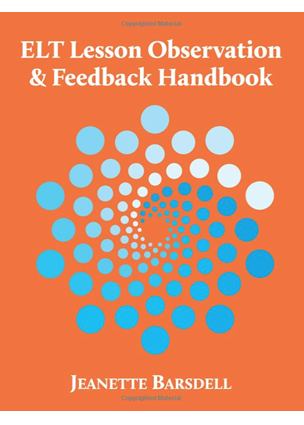Join us in this week's Industry Voices for a conversation with Jeanette Barsdell. Having studied her CELTA, Delta, and Teacher Trainer certificate with IH and worked for us for many years in Poland, as well as for other schools around the world, Jeanette is a font of ELT knowledge. She has recently published a book, ELT Lesson Observation & Feedback Handbook, which aims to act as a practical, hands on guide guide for ELT professionals.
Starting out in ELT
I did my CELTA at IH Hastings and then went to Thailand for a couple of years. After working at a few schools there I came back to the UK and did my DELTA at IH London, which was great. After gaining more experience in both Spain and Scotland, I was offered a job at IH Katowice, in Poland, as Director of Studies.
Moving to Poland
I had no idea where Katowice was – I had to look it up on the map! I started there at the beginning of the 90’s, just after the Berlin Wall had come down. It was a fascinating time to be there, a fantastic experience. I really felt that I was in the right place at the right time. I spent around 8 years in Poland in total, and it was a really interesting period to be there – the changes I saw were unbelievable. When I first arrived there weren’t really any restaurants, empty shops, and very little in terms of consumerism other than some absolutely beautiful flowers which you could buy. But the people were amazing, so lovely, and really keen to learn English. Before I arrived in Katowice I had no expectations, all I knew was that it was a mining area, so everything was a bonus and it really was a lot of fun in those early days.
Local life
The locals were so friendly and so kind to us. At the time the country had just opened up to the West, so people were very curious – the whole town know who we were, they knew all the International House teachers! You’d try and give your address to a taxi driver in broken Polish, and they would say ‘no problem, I know where you live’, or they would call their friend and say ‘I’ve got the brown-haired teacher in my taxi, what’s the address?’ and the friend would know. We always got home no problem, it was wonderful!
Developing a career with IH
When I started at the school I worked as a DOS with five local teachers and we won a huge contract which was great. Within a year we had employed a further ten teachers through International house to work with the five original teachers. We then opened another school in Bielsko-Biala of which I was partner and followed this by opening a further school in Wroclaw. Eventually I was the manager of five DOSes, and a decision was made to open a CELTA centre to train teachers there - partially to ease the pressure on recruitment as by this stage we were hiring up to 100 teachers a year. I went over to IH Barcelona and did the CELTA Trainer course. I had Scott Thornbury and David Clarke as my mentors and they were absolutely brilliant. As a DOS I had been mainly managing people, so it was brilliant to get back in to the academic side of things, reminding myself of all the grammar and looking at teaching approaches – becoming a CELTA trainer was completely different. After returning to Poland for a while I eventually I moved over to New Zealand and helped expand a teacher training department there.
Experiences leading to a book
All of these experiences are what ultimately led me to write my book. There was a particular moment when I was first in Poland, and the owner of the school asked me to do a lesson observation because there had been a complaint from a student, and I felt panicked. I didn’t yet feel 100% confident with my own classes, let alone giving feedback on someone else’s. Although I’d done my Diploma I really didn’t feel comfortable observing – I had the teacher’s career in my hands, the expectations of the school owner to deliver, and I felt unequipped to deal with the situation. Luckily, I was saved, because another senior team member noticed the panic in my eyes, took me aside and showed me what to do. From that point on I realized that lesson observing is one of the most important parts of the job, but there isn’t really any specific training for it, and it can be very nerve-racking, because of the level of responsibility involved.
 ELT Lesson Observation & Feedback Handbook
ELT Lesson Observation & Feedback Handbook
I decided to use these experiences and create something practical that can be used to help with lesson observations. The book is aimed at DOSes, teacher trainers and anyone who has to give classroom feedback. There are so many things to consider when giving feedback and it can often be hard to know where to begin, even in terms of choosing the right wording. It can be difficult to find the right balance when trying to give honest, practical, helpful and encouraging feedback. People often comment that they just don’t know what to say, and need language chunks which they can use. The book therefore contains lots of examples of language which can be used when giving feedback – things you can say if the teacher does this or that, both positive and for things they can improve on.
There are also tips on decoding a lesson plan that is given to you pre-observation, in order to be able to develop ideas on how to help a teacher improve. Sometimes teacher trainers or DOSes will be watching a lesson, and they’ll be able to tell that the lesson isn’t going well, but they can’t work out what it is that the teacher needs, and that is a very specific skill.
There are techniques that can be applied to help with lesson observations, and these are discussed in the book. When you start observing classes you need a framework that you can measure against, and the book includes some measuring systems. The idea of the book is to act as a handbook of practical things that you can do when observing lessons. Its aim is to help trainers and DOSes be able to give constructive feedback. It’s meant to be a positive guide. The book contains checklists that can be used to generate quality feedback quickly. When you’re working flat out, long hours, you need something practical that you can turn to - something more hands on, a quick manual to refer to - and that is the aim of the book.
Find out more or buy the book
Visit Jeanette's blog for more practical tips.
Jeanette's book is available to purchase on Amazon.



